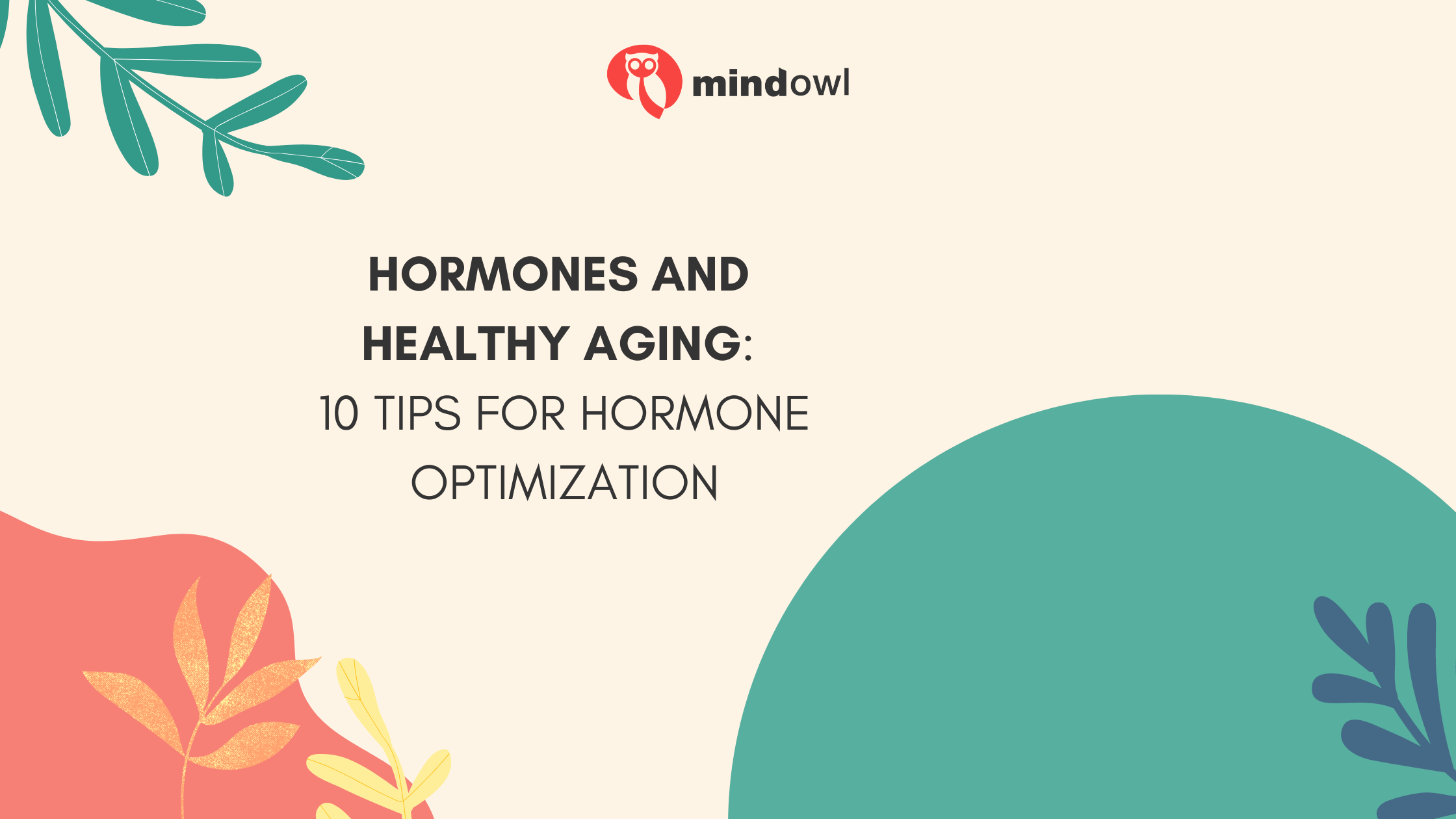Aging is a natural process that inevitably brings about changes in our bodies. One of the most critical aspects of aging involves hormones, which are chemical messengers that regulate many bodily functions. As we age, our hormone levels can fluctuate, leading to various health issues. However, by optimizing hormone levels, we can promote healthy aging and maintain vitality. Here, we explore ten comprehensive tips for hormone optimization to help you age gracefully.
1. Understanding Hormones and Their Role in Aging
Hormones are produced by glands in the endocrine system, including the thyroid, adrenal glands, and reproductive organs. They control a wide range of functions, such as metabolism, mood, energy levels, and reproductive health. As we age, hormone production and balance can be disrupted, leading to symptoms like fatigue, weight gain, mood swings, and decreased libido. Understanding the pivotal role of hormones in aging is the first step toward maintaining health and vitality.
Aging affects several key hormones. For instance, estrogen and progesterone levels decline in women during menopause, leading to symptoms like hot flashes, night sweats, and osteoporosis. In men, testosterone levels gradually decrease, contributing to reduced muscle mass, energy, and libido. Thyroid hormone levels can also decline, affecting metabolism and energy. By understanding these changes, we can take proactive steps to mitigate their impact.
2. The Importance of a Balanced Diet
Diet plays a crucial role in hormone health. Consuming a diet rich in fruits, vegetables, whole grains, lean proteins, and healthy fats supports hormone production and balance. Certain nutrients are particularly beneficial for hormone health. For example, omega-3 fatty acids found in fish and flaxseed help produce anti-inflammatory hormones. Fiber helps regulate insulin levels, while antioxidants protect hormone-producing glands from damage. Avoiding processed foods, excess sugar, and unhealthy fats can prevent hormonal imbalances.
Phytoestrogens, plant compounds that mimic estrogen, can also support hormone balance, especially in women during menopause. Foods like soy, flaxseeds, and chickpeas contain phytoestrogens that can help alleviate menopausal symptoms. Additionally, maintaining a regular eating schedule and avoiding excessive calorie restriction can prevent hormonal disruptions related to metabolism and stress.
3. Exercise and Its Impact on Hormones
Regular physical activity is essential for maintaining hormonal health. Exercise helps regulate insulin levels, reduce stress hormones like cortisol, and promote the production of endorphins, which enhance mood and energy. Both aerobic exercises, such as walking, running, or swimming, and strength training can positively influence hormone levels. For instance, strength training can boost testosterone levels, which are important for muscle mass and bone density.
High-intensity interval training (HIIT) has been shown to improve insulin sensitivity and increase human growth hormone (HGH) production, which is crucial for cellular repair and metabolism. Consistent exercise also supports thyroid function, enhancing metabolism and energy levels. Incorporating a variety of physical activities into your routine can provide comprehensive benefits for hormonal health.

4. Stress Management for Hormonal Balance
Chronic stress is a significant contributor to hormonal imbalances. When stressed, the body produces cortisol, a hormone that, in high levels, can disrupt the balance of other hormones. Effective stress management techniques are crucial for maintaining hormone health. Practices such as mindfulness meditation, yoga, deep breathing exercises, and spending time in nature can help reduce stress levels. Ensuring adequate sleep is also vital, as poor sleep can negatively impact the production of hormones like melatonin and growth hormone.
Mindfulness-based stress reduction (MBSR) techniques can lower cortisol levels and improve overall well-being. Additionally, engaging in hobbies and social activities can provide emotional support and reduce stress. It’s essential to recognize and address sources of chronic stress, whether they are related to work, relationships, or lifestyle factors.
5. Biodentical Hormone Therapy
Also known as biodentical hormone balancing, this form of hormone replacement therapy is used to address hormonal imbalances, particularly during menopause and andropause. This approach involves using hormones that are chemically identical to those produced by the human body. The goal is to restore hormone levels to their optimal range, alleviating symptoms associated with hormonal decline. This therapy should be personalized and closely monitored by a healthcare provider to ensure safety and effectiveness.
Bioidentical hormones are derived from plant sources and tailored to match individual hormonal needs. They can be administered through various forms, including creams, gels, pills, and patches. This therapy has shown promise in reducing symptoms such as hot flashes, night sweats, mood swings, and decreased libido. However, it’s important to work with a knowledgeable healthcare provider to determine the appropriate dosage and monitor any potential side effects.
6. Maintaining a Healthy Weight
Weight management is closely linked to hormonal health. Excess body fat can disrupt hormone balance, particularly insulin and sex hormones like estrogen and testosterone. Adipose tissue (body fat) can produce estrogen, leading to imbalances, especially in postmenopausal women. Maintaining a healthy weight through a balanced diet and regular exercise can help keep hormones in check. Conversely, being underweight can also affect hormone levels, so it’s essential to aim for a healthy weight range.
Achieving and maintaining a healthy weight involves a combination of dietary choices, physical activity, and lifestyle modifications. It’s important to focus on long-term, sustainable habits rather than quick fixes. Consulting with a nutritionist or healthcare provider can provide personalized guidance on achieving and maintaining a healthy weight.
7. The Role of Sleep in Hormone Regulation
Quality sleep is fundamental for hormonal balance. During sleep, the body undergoes crucial processes that restore and regulate hormone levels. Growth hormone, which is vital for tissue repair and muscle growth, is primarily secreted during deep sleep. Melatonin, which regulates the sleep-wake cycle, is another hormone affected by sleep patterns. Establishing a consistent sleep schedule, creating a relaxing bedtime routine, and ensuring a comfortable sleep environment can enhance sleep quality and, consequently, hormone health.
Sleep disorders, such as sleep apnea and insomnia, can significantly disrupt hormonal balance. It’s important to address these issues with the help of a healthcare provider. Techniques like cognitive-behavioral therapy for insomnia (CBT-I) and sleep hygiene practices can improve sleep quality. Additionally, reducing exposure to blue light from screens before bedtime and maintaining a cool, dark sleep environment can support melatonin production.
8. The Impact of Environmental Toxins
Environmental toxins can disrupt endocrine function and hormone balance. Chemicals found in plastics, pesticides, and personal care products can act as endocrine disruptors, mimicking or interfering with the body’s hormones. Reducing exposure to these toxins is essential for maintaining hormonal health. Opting for organic produce, using natural cleaning products, and avoiding plastic containers for food storage can help minimize toxin exposure. Regular detoxification practices, such as drinking plenty of water and consuming detoxifying foods like cruciferous vegetables, can also support hormone balance.
Phthalates, parabens, and bisphenol A (BPA) are common endocrine disruptors found in many consumer products. Choosing products labeled as “phthalate-free” and “paraben-free” can reduce exposure to these harmful chemicals. Additionally, using glass or stainless steel containers for food and beverages can minimize BPA exposure. Supporting the body’s natural detoxification processes through adequate hydration, a nutrient-rich diet, and regular physical activity can further promote hormonal health.
9. Supplements for Hormonal Health
Certain supplements can support hormone optimization. For instance, vitamin D is crucial for hormone production and regulation, and deficiencies can lead to imbalances. Omega-3 supplements can reduce inflammation and support hormone function. Adaptogenic herbs like ashwagandha and rhodiola can help the body adapt to stress and balance cortisol levels. However, supplements should be used judiciously and under the guidance of a healthcare provider to ensure they are necessary and beneficial.
Magnesium is another essential nutrient that supports hormone health by regulating cortisol and promoting relaxation. Zinc plays a vital role in testosterone production, while vitamin B6 helps regulate mood-related hormones. Herbal supplements like black cohosh and evening primrose oil can alleviate menopausal symptoms. Before starting any supplement regimen, it’s important to consult with a healthcare provider to ensure safety and appropriateness.
10. Regular Medical Check-Ups
Regular medical check-ups are essential for monitoring hormonal health. Blood tests can help assess hormone levels and identify imbalances. Early detection of hormonal issues allows for timely intervention and management. Working with a healthcare provider who specializes in hormone health can provide personalized strategies for hormone optimization. This may include lifestyle modifications, dietary changes, and, when necessary, hormone replacement therapies.
Hormone panels typically measure levels of key hormones such as estrogen, progesterone, testosterone, thyroid hormones, and cortisol. These tests can provide valuable insights into overall health and help guide treatment decisions. Regular follow-up appointments and monitoring are crucial to ensure that any interventions are effective and adjusted as needed.
Conclusion
Optimizing hormone levels is crucial for healthy aging. By understanding the role of hormones, maintaining a balanced diet, engaging in regular exercise, managing stress, considering biodentical hormone therapy, maintaining a healthy weight, prioritizing sleep, reducing exposure to environmental toxins, using appropriate supplements, and having regular medical check-ups, individuals can support their hormonal health. These strategies can enhance overall well-being, improve quality of life, and promote longevity.
A proactive approach to hormone health involves making informed lifestyle choices and seeking professional guidance when necessary. By taking these steps, you can navigate the complexities of aging with greater ease and maintain your vitality for years to come.
MindOwl Founder – My own struggles in life have led me to this path of understanding the human condition. I graduated with a bachelor’s degree in philosophy before completing a master’s degree in psychology at Regent’s University London. I then completed a postgraduate diploma in philosophical counselling before being trained in ACT (Acceptance and commitment therapy).
I’ve spent the last eight years studying the encounter of meditative practices with modern psychology.

